Natural is a word he likes very much. I've heard it a lot from him. He doesn't seem like the kind of man who tries to appear to be something other than he is, to hide behind an image. He's natural, direct and friendly. I didn't know Dragos Maracineanu before this interview. We hadn't discussed it before, but I knew the company he runs. I was very curious to hear from him about his journey as an entrepreneur in Romania. So I challenged him to a chat at the company he founded and runs, Felder Gruppe Romania.

What was your start in entrepreneurship like?
The beginning was natural. I simply wanted to buy a machine. I was helping a friend. At the time I was working for an American company, in the oil machinery area. I really enjoyed interacting with the people at Felder, it was very professional. The way I formed a personal relationship with the guy I was talking to at Felder KG naturally led us to a discussion about what if we did something more articulate in Romania? The Felder brand was, let's say, underused, not exposed enough. So it fit me like a glove. Then I worked hard, I liked it, I work hard, I like it, I found my place. Me being a construction man, and Felder being a family business - started by Mr. Johan Felder 60 years ago - slowly, slowly things evolved and are still developing. Until the crisis we had double-digit growth every year. The market was growing, we positioned ourselves very well at that time, it was a happy meeting.
Did you have business experience when you started Felder Gruppe Romania?
The business experience exists. The environment I was exposed to before starting with Felder was pretty high. I got to know the top American management of companies I had only heard about in Forbes or the Financial Times. At the time I didn't realise the true value of the experience. But then, when I was on my feet, I kept reminding myself what I had learned, how it was done. This helped me very, very much. It's just that the entrepreneurial area takes you out of the corporate area. That's where I felt a bit constrained. I like to push things, not delay things that can be done immediately.

How do you see the history of Felder Gruppe Romania?
I think our work can be divided into three periods. The first was until 2008 when we had growth. Then, until 2015, it was a period of not at all smooth recovery, with shake-ups, with all kinds of realignments, both in terms of strategy and market settlements. Then from 2016 things started to take a minimally predictable trajectory, it started to feel better year on year.
How was it during the crisis? I know you had to part with 2/3 of your colleagues.
Yes, that's right. There's a reason it's called the crisis of the century. The adjustment has been radical. Investment goods are the first to go into crisis and the last to come out of crisis. Obviously we had to adapt. We were trying to strengthen the team then, the results were good. From 15 November 2008 things froze. Sales then dropped by 82%. It was not easy.
What happened in the following period, 2009-2015?
In the industry, not much, honestly, because there was nothing more you could do than try to adapt and find solutions. But at the same time, there were enough things that happened to change my perception of how things were going and influence my decisions going forward. Until 2010, things were stagnant, they had their own rhythm that you couldn't really intervene on because the market wasn't ready. From 2010-2011 we shook it up a bit and started to think applied, things couldn't go on like this forever. If the market wasn't going to open naturally, then you had to do something.
So, we tried to unfreeze the market by offering clear solutions to the producers. We launched the Flex-Fin flexible financing programme to offer real help to producers when they were coming out of the crisis, when banks were not offering easy credit, etc. Through the Flex-Fin programme we responded to clear needs, we offered leasing, advice on funds, instalments. We launched the Buy-Back programme and created a G+ programme of extended guarantees, all designed to give customers more security, more confidence. And it worked!
The period 2014-2015 was marked significantly by European funds, a sign that the market was beginning to have the courage to invest again. And this was felt. It was a respite after years of ups and downs not only for customers, but also for us. And that brings me to the present.

That is, from 2015 to today...
European funds and the temptation of money that seems to pose little risk distort the perception of the relationship between real need and aspiration. The discourse of the clinicians had changed because the market had gained momentum. And then we felt that we had to talk to customers in an applied way about the quality they need. We didn't want to sell at any price. Quality is not about having the best, the most expensive, but what's best for you at that point in your development. In short, all our communication went in that direction.
That's how A quality friend. We have concluded a Partnership for Excellence in the Wood Industry with the Romanian Quality Association. We started to deliver articles for quality to define it, we tried to have a common language together. These things have also happened internally. It was natural that employees also understood quality in their work, whether that meant simply doing your job better or becoming a consummate professional.
We have therefore started to invest heavily in training for employees, especially for the Blitz Service team. Quality cannot be served without knowledge. We couldn't expect the customer to understand quality if we didn't try to get better and better. Since 2015, Blitz Service technicians have been attending traning at the factory training centre in Austria several times a year. Sales consultants benefit from annual technical and product trainings. If you don't know the machining machines and whose needs they meet, then how can you expect to offer the customer solutions tailored to their needs? How can you tell him about the quality he needs if you don't know how to provide it? The answer is simple, you can't unless you are well prepared. So we invested in people and their training. We have invested in solutions that facilitate the relationship between the client and the company, in communication and internal organization platforms, in a new CRM more powerful and adapted to new market requirements, new dynamics, in the development of an e-commerce platform similar to retail markets.
Since 2016, the market has become more stable, allowing us to continue the pace of investment. Today we have the largest team in the industry, we have doubled our number since 2014-2015. We have 7 technicians in Blitz Service - the technical support program, 2 dispatchers for the service hotline, 9 sales consultants, 4 specialized trainers. These are just the structures of the company that come into contact with customers on a daily basis.
How has the entrepreneur Dragoș Mărăcineanu evolved during this period?
I like to think of myself - and this goes for my team as well - that we learn every day, both from personal mistakes and from the mistakes of others. The one constant in this industry is unpredictability. After 20 years, I still can't come up with a sales forecast that even remotely aligns with the bottom line. We've tried looking at time series, seasonal influences, we haven't come to any conclusions. The most eloquent example was in 2012 when, after having some very tough crisis years, we had 100% growth in the first quarter. Then events quickly followed such as the fall of the Boc government, the Ungureanu government, President Băsescu was suspended and suddenly the turnover of that year dropped to 50% compared to what we had budgeted. How can you predict that? Especially in an industry that is dominated by small and medium sized companies to the tune of 95%.
Dragoș Mărăcineanu is not the kind of interlocutor with whom you have to "work" a lot to find out what he thinks. He likes to talk, and his thoughts seem to always come before his words. He is very coherent and dense in communication.
And how has the industry evolved throughout this period?
Looking back a bit, both at us and the industry as a whole, I think naturally. In this industry we sell investment goods. Decisions are made in relation to the confidence you have in the future. You don't start investing your money or borrowing if you don't have confidence in what the future holds. And the future gives you a lot of unpredictability. And that's when the business instinct of self-preservation kicks in and you say, "let's hang on a bit, let's see what happens". And that's natural. I think that fine balance between how much you listen to your self-preservation instinct and how much you develop your risk appetite can make the difference between failure and success. If you're three days smarter than your competition it can be dangerous, but if you're an hour smarter it can be enough to have that long-term advantage. The point is not to stand still.
In addition, the industry has become much more responsive to change, to technologies. The openness of communication, the dynamics of technology, but also current challenges such as labour shortages, make people look around for new processing solutions. But the real challenge is to understand technology and what it can do for you. Now it's about information, about knowledge.

What exactly happened from this perspective?
A few years ago there were customers who didn't want to hear about CNC, they refused to discuss CNC technology. This was another step in their development and a game-changer, a game-changer of perspective and rules. Nothing is the same when I have a CNC in the shop. They said they didn't have the money. We were explaining to them that the solution is not for now, that they need to understand the technology first, understand what the technology can do for them and slowly, slowly make the step. As long as you don't access new levels of knowledge you are doomed to stay in place. Our advice is not conditional on investment. When the client wants - because it's their money - we will discuss the commercial side, but in the meantime we are a good friend. We try to go along with the client until they decide to take the plunge. Hopefully, with us.
It can take two years, three years from the time we start the investment advisory with the client to the time we actually do the transaction. As long as we have someone to talk to, as long as people are open to thinking about their future, for us it's a sign that they will buy. We have the opportunity to transfer know-how and not let them make certain mistakes. Because it's not the same as when you get a TV and you get the wrong diagonal. You can put it in another room or in the attic and you have solved the problem. In our case, if you didn't make the right move to a machine that then conditions your capacity and flexibility in production, it may be that all your subsequent decisions will depend on that. If, for example, you switch from hand tools to CNC it might be too much. Because you need a period of time to digest, to somehow get used to the new technology.
We believe in taking the right steps, not small or big ones. The Felder portfolio is specifically built as a ladder that allows you to grow at your own pace. We don't have €2,000 equipment, €10,000 equipment and then €100,000 equipment. We have, for example, 15 circular models that start at €3,000 and go up to €200,000. This allows us the flexibility to not just impose certain solutions. Excluded! We can sell in each step what the customer wants and very importantly, at his pace of development. We advise clients not to burn steps because it is counterproductive for them. A CNC is not an end in itself. It is a means of production that helps you produce better, more efficiently. You have to be aware that the money you have given has to fulfil this purpose. This is not about status. I don't have to look the other way. There are things that show up on the balance sheet. That's where it will say whether you made a profit or a loss, whether you met your goals. The rest is just excuses or regrets.
After Ligna there was a wave of enthusiasm with Industry 4.0. What do you think of the momentum it has gained in Romania recently?
The main markets for machinery manufacturers are Western markets. There's a different level, different money, different culture, different experience, different predictability. It is obvious that the discourse of the big manufacturers is oriented towards their key markets. There it's more natural to push a 4.0 when they've already reached industrial machines whose only problem was that they didn't communicate with each other. With us it's a bit different. We haven't yet come to understand what effect using a CNC has in production, that it has to be put in the right context.
We have clients who have invested in technology and can't find people to operate it or don't know what to ask them. It's good to show the furniture manufacturer where it's going, but everyone has to go there at their own pace. Unfortunately a distorting factor is European funding. Access to some free money creates the opportunity to buy expensive and very complicated machinery. But what is more expensive is not necessarily what is best for you.
The discussion inevitably reaches the customer. Dragos puts the client and the relationship they build together at the heart of his business. Knowing some of his colleagues, I realise where the consistency in communication that I have noticed at Felder Gruppe Romania comes from. The consistency with which Dragoș communicates a basic idea (Felder, a quality friend) in so many ways is almost impossible not to have touched them too.
What exactly does Felder Gruppe - A quality friend mean?
Being a quality friend reflects our company philosophy. You can't fake it here. The customer feels you if you are not authentic in what you say and what you deliver afterwards. It's kind of hard to be credible. We started communicating publicly about this five years ago and developed the direction in which we wanted to get closer and closer to the customer. To understand them, to advise them, not to make them feel pressured to buy from us, not to entice them with special offers that don't have coverage. Because what I have in the special offer might not suit you. I believe that you don't get a machine with special offers, you get it when you need it.
It is important that the things we deliver in terms of information are covered by the subsequent facts. We have customers who started with Hammer, our small workshop range, and now have CNCs. That doesn't happen overnight. Slowly but surely, they are now in a different league because they trusted the partnership and we feel comfortable working with customers who want to continue working with us. It's a win-win situation.
The way he looks for and finds ways, tools to meet customer needs is a lesson for others in the industry. Terms like buy-back, installments, leasing come up often and demonstrate the willingness to learn, transform, adapt of the organisation he leads.
The way we grow with the customer is not only about the vertical, i.e. they will at some point end up buying the most complex machine we have. We also grow with customers in the new investment process. We offer consultancy, we offer buy-back if necessary, we have a unique Flexin financing programme in the industry that includes both instalments and rental, leasing, consultancy for European funds, consultancy for obtaining bank loans, just to see, both us and the customer, what suits them. Everyone has their own risk appetite.
We have to adapt and put the right solutions on the table so that in the end we meet our goal of making the customer happy. He has to say in a year or two "Yes, you were right, this is the machine I need. Now I'm ready to take the next step." We wouldn't last 20 years if we sold once and that was it. There are still over 4,500 customers who have bought from us. It's no accident.
And that brings us to the recently launched campaign: The next step for your business. What is the purpose of this campaign?
The main aim of this campaign is for people to define their development. We want to get them to figure out for themselves what development means. Do I need people or another machine? Do I need to reduce losses? It may seem slightly arrogant. I'm now going to teach customers what development means. "Wait till Felder teaches you about development!" That's not the point.
This is somehow the result of an experience we had with the Quality Friend platform, when we started talking articulately and appliedly about quality. Surprisingly, everyone talks about quality, but when you try to define it there are conflicting answers. We had internal meetings where we asked colleagues What is quality for you? The answers made me realise that we talk about quality but fail to conceptualise it. In a business it is good to have a common language somehow. I don't think that, for example, Japanese quality should be different from the quality of the smallest manufacturer in Romania. I'm not talking about the level of quality, I'm talking about the understanding of what quality means. And because we don't have to invent the wheel, we simply communicate it. It is the same in this area of business development. Not to mention a Romanian-born scientist from Braila, J.M. Juran is considered one of the founders of the concept of total quality management.
Every entrepreneur sees his company in a certain way, wants to do in a certain way. Very good. I don't teach you how to develop yourself. This is the internal engine that drives you forward. But again, we don't want to reinvent the wheel. This development has some coordinates. What goals do I set for myself, what do I expect from a new investment, from my next development step. Everything has to be measurable and scalable. Maybe a more expensive machine isn't the answer, maybe you need a machine to produce something different. Maybe you see that you have a skill that is appropriate in an area that many people are not good at. Then maybe you don't need to buy a seventh machine to produce more, but a different machine that, together with your competence, can help you stabilise your business better.
I refer, for example, to the integration of processing of mineral materials in woodworking or replacing conventional circular saws with an industrial package sawing unit. Because not many people can do that. You have to decide what you need more of. If I want to produce faster I need certain specifications. If I want to produce more flexibly I need something else, because I can't be flexible and fast. Technologies limit you! The workforce limits you! Skills limit you! Raw material suppliers limit you! There is no one thing that does it all. We tell our customers this every day: there is no machine that will do it all, no matter how much money you have available, just as there is no cheap technology, even CNC, that you can rely on.
Rather, we try to recommend to the client what we think would suit them: Look, you have this kind of machine, we think the next step for you would be this. Think about it, consider our experience. They are like seeds that we are slowly planting, so that they can benefit from the know-how that we have accumulated over so many years. If they say yes, but I don't buy from Felder or yes, but I don't want that, there's no problem. At least we launch the development theme, put it on the table and from there everyone will take the next step according to their openness.
How did you think of applying this concept? How will you help clients define their development, discover their priorities, their goals?
We want them to practically experience the next step in their own workshops or factories. Basically, we'll give them machines to use for a year, at no cost to them. They will have to use them and see what they can achieve with them. It all comes with training. We have experts who will come and explain to them what this technology means for them: this can be done, this can't, you can improve here, these are the limitations, etc. They may find that they are only using the technology, the machine, at half capacity. We have had cases! What do we ask our customers? Openness! The moment they want to interact with us, we will force them to ask some questions so that we can see together what is realistic and what is not.
Through this program Dragos wants to share the business experience that he and his colleagues at Felder have gained over the years. It is as if he considers the experience he has gained as a resource, an asset as some would say, which he wants to use for Felder's benefit, offering a free service to clients.
What do you think should change in the industry?
Companies confuse technology with business. The fact that you know how to make a piece of furniture is all very well, but you have a business to run. As I learned in college, nothing happens until something sells. As long as you're not able to deliver and cash in on what you've produced, nothing is going to happen. To get to that end, everything behind it has to be well put together. There's no point getting some machines if they don't help you. Maybe they're too expensive, maybe too cheap. You simply have to understand which is the right solution for you and when it's time for it. So you can sell more.
For example, the European funds have made many producers think of investing in blocks, they have postponed any investment until the money comes in. But this can take years. But in the meantime, one-off investments can be made to solve one-off problems and bring you closer to your goal: Is the Circular only causing me problems? Then replace it with a new one. Otherwise, I'm likely to get stuck and the difference will show up in orders because the market doesn't stand still.
Fifteen years ago nobody thought about rounding at the ends. Now the end customer is looking straight there. It's the first thing he gets his hands on. What are you doing?! You're forced to do this and if you don't do the next step in time you've lost the next order, then the next and you don't even know where the problems come from. Because you're mentally locked into taking that necessary step. You've waited for years for the European funds, they come eventually, but the social and economic conditions have changed so much that, for example, you can't find people to work on those machines. So what do you do?
The even sadder part comes when expectations remain intact even if you want a fund with much less money, e.g. Start-up Nation. You try to cram in there, without understanding and without wanting to listen, everything you ever wanted. That's how you end up with a lot of stuff in your workshop - your first workshop, your dream - that breaks all the time and you don't understand why. Start-up Nation is supposed to be a business plan not an online shopping session. Starting a business in Romania is hard enough. Why choose to make it harder? Unfortunately, that's when you start to understand the saying that it's not quality that costs, it's the lack of it.

How the 2 communication platforms will reconcile. I'm talking about A Quality Friend and The next step for your business?
A quality friend and The next step for your business are congruent and based on our business strategy from the beginning. When the floods hit in 2006 we, on our own initiative, called our customers in Moldova. We went there and repaired the machines of those affected for free. Between 2007 and 2009 we offered excellence scholarships to students from the Faculty of Wood Engineering in Brasov, in 2013 and 2017 we equipped the laboratory of the same faculty with complete machining machines, we offered our customers a presentation stand at BIFE-SIM, we organized annual machining workshops, recently we conducted free seminars for consulting on Start-up Nation, all over the country, with selected banks and consultants. These are things we haven't publicised much, but they are an important part of our relationship with clients. We see ourselves as entering into partnerships, not transactions.
We are the only company that, for almost 20 years since we have participated in BIFE-SIM, we enter the pavilion 10 days in advance, even if we have to pay extra. Because we want to have everything ready two days in advance. As a sign of respect for what will happen there, as a sign of respect for those who will visit us.
It's proverbial the way I set up machines after they've already been set up by my colleagues. I want that one to the left, the other to the right. And everyone jokes about it. But that's because I want us all to have the peace of mind at the end that we've given it our all. Then we can say: Now come to us, we are 100% ready for you.
How do you see the future? What do you propose to do next?
Unlike other times, people now have a different relationship with the future. Things have started to move beyond the bumps in the road. Worries are no longer the orders. The concerns are now people, the workforce.
We will continue to do what we do best, we will keep our promise, we will take the next step with our customers. In the coming period we will launch the most complete web platform in the industry where customers will find everything they need, we will launch in Bucharest a complete training and demonstration centre for operators in workshops and factories, we will continue to organize processing and consulting workshops. We will continue to train our people in all company structures. We will talk more and more appliedly with manufacturers about automation and workflow improvement, not only at the industrial level, but also at the classical machining level. All small and medium-sized companies need to know that improving production is not just CNC, not just Industry 4.0, but that there is applied technology for classical processing. We have already launched this topic at BIFE-SIM:Craft 4.0 and Industry 4.0.
When the orders push you, the financial relaxation is greater and it is natural to think about the next step. We're in a period where people can think about growth, and our message is that the next, safe step for your business can be taken with Felder.
Felder Gruppe Romania is a trend setter for the wood industry, a benchmark for others. Their moves are analysed by the market. Dragoș is aware of this fact, knows it well and wants it. He has vision and that helps him. And his medium and long-term plans give the impression that Felder Gruppe Romania is firmly establishing itself in the Romanian woodworking machinery market with clear and coherent policies. And all because Dragoș Mărăcineanu wants to be an hour smarter than the competition.
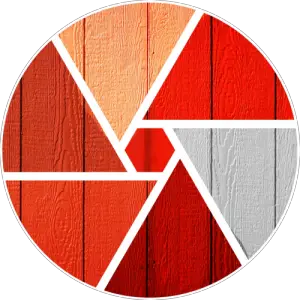
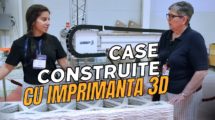
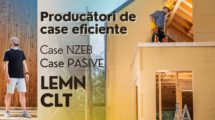
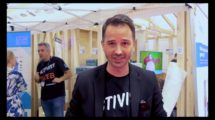
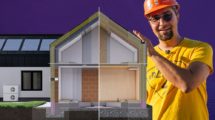
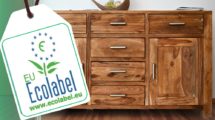
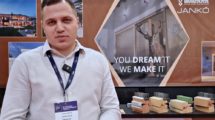
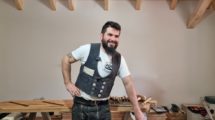



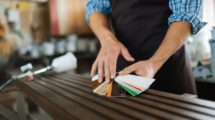
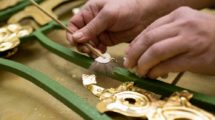


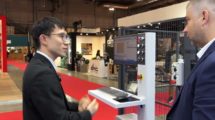


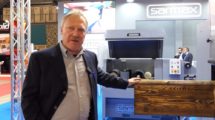
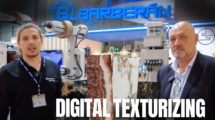
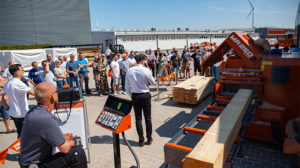
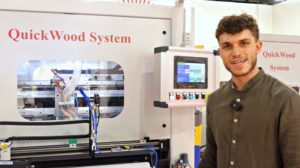
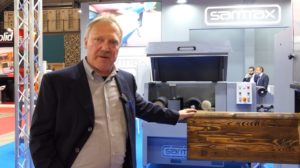
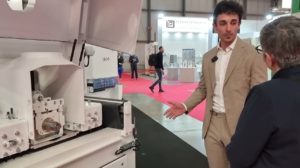



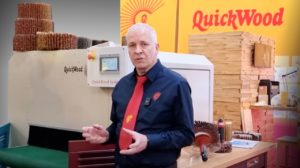

Add comment